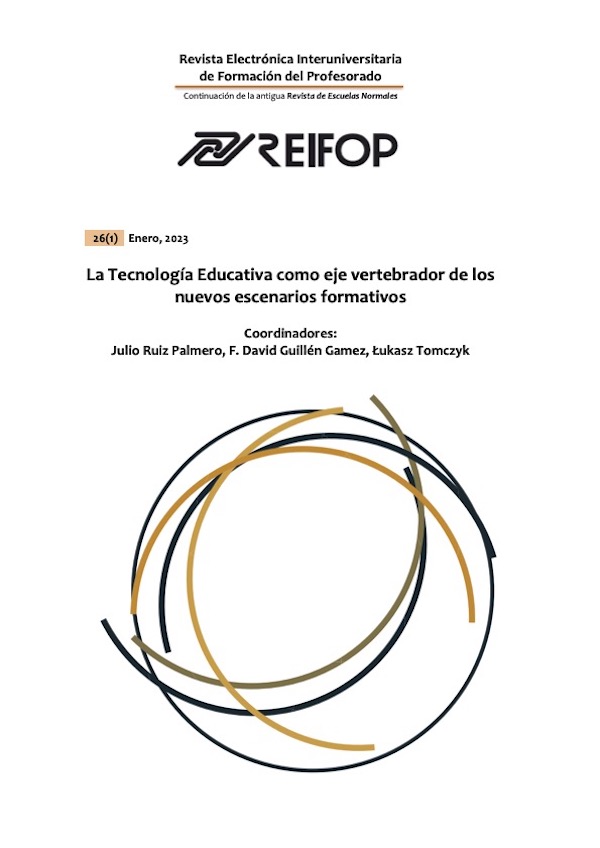Social implications of the emergence of Big Data and robotics: a prospective analysis in Hispanic American teachers
Abstract
Big Data is one of the most socially disruptive technologies, along with artificial intelligence. Numerous studies have shown that, through the development and implementation of these tools in education, it is possible to achieve one of the "old aspirations", which is the personalisation of education. This exploratory study focuses on finding out, through an ad hoc questionnaire, the social vision of South American teachers, working at different educational levels, of some social and future aspects of Big Data, artificial intelligence and robots to see to what extent their opinion coincides with the advantages and problems expressed in scientific research on these topics. A non-probabilistic sample of 283 teachers was collected. The descriptive statistical analyses show that the majority of teachers think similarly to what is expressed in the research, and this will influence their decision-making and the explicit and hidden curriculum.
Downloads
-
Abstract1682
-
PDF (Español (España))761
References
Abbott, R., & Bogenschneider, B. (2018). Should robots pay taxes: tax policy in the age of automation. Harvard Law & Policy Review, 12(1), 145-176.
Alcalde, G., & Alfonso, I. (2019). Utilización de tecnología Big Data en investigación clínica. Revista de Derecho y Genoma Humano, nº extraordinario, 55-83. https://dx.doi.org/10.14679/1133
Aguilar, S. J. (2018). Learning analytics. At the nexus of big data, digital innovation, and social justice in education. Tech Trends, 62(1), 37-45.
Bostrom, N. (2016). Superinteligencia caminos, peligros, estrategias. TEELL.
Blázquez, F. J. (2022). Riesgos para la privacidad en la aplicación de la inteligencia artificial al ámbito biosanitario. Anales de la Cátedra Francisco Suárez, 56, 245-268. https://dx.doi.org/10.30827/ACFS.v56i0.21677
Cabezón, S., & Morilla, R. (2021). Big Data en salud: un nuevo paradigma para regular un desafío para la justicia social. Revista Española de Salud Pública, 95(1), 1-13.
Comisión Económica para América Latina y el Caribe, CEPAL (2018). Datos, algoritmos y políticas. La redefinición del mundo digital. CEPAL.
Corral, V. (2021). Estrés percibido en adultos mayores mediante el uso de robots sociales durante el Covid-19. MLS Psychology Research, 4(1), 7-22. https://doi.org/10.33000/mlspr.v4i1.598
Díaz, J. M. (2021). El robot como contribuyente. Reflexión sobre la personalidad jurídica. Anuario de la Facultad de Derecho. Universidad de Extremadura, 37, 51-73.
González, L. M. (2018). La crisis de la democracia representativa. Nuevas relaciones políticas entre democracia, populismo virtual, poderes privados y tecnocracia en la era de la propaganda electoral cognitiva virtual, el microtargeting y el Big Data. Revista de Derecho Político, 103, 257-302.
Han, B.C. (2022). Infocracia. La digitalización y la crisis de la democracia. Taurus.
Harari, Y.N. (2018). 21 lecciones para el siglo XXI. Penguin Randon House Grupo Editorial.
Izaguirre, L. (2022). Retos que plantean los robots en el Derecho Financiero: ¿fin del sistema tributario? Revista de contabilidad y tributación: Comentarios, casos prácticos, 471, 77-106.
JASP Team (2022). JASP (Version 0.16.3)[Sofware de ordenador].
Lozoya-de-Diego, A., Villalba-de-Benito, M. T. & Arias-Pou, M. (2017). Taxonomía de información personal de salud para garantizar la privacidad. El profesional de la información, 26(2), 293-302. https://doi.org/10.3145/epi.2017.mar.16
Martínez, A. (2019). La inteligencia artificial, el Big Data y la era digital: ¿una amenaza para las personas? Revista La propiedad inmaterial, 27, 5-23. https://doi.org/10.18601/16571959.n27.01
Ossandon, F. (2020). Taxation on robots? Challenges for tax policy in the era of automation. Revista chilena de derecho y tecnología, 9(2), 187-219. https://dx.doi.org/10.5354/0719-2584.2020.55578
Pastor, D. (2020). Epidemiología digital. Revista Diecisiete, 3, 99-117.
Reidenber, J. R., & Schaub, F. (2018). Achieving big data privacy in education. Theory and Research in Education, 16(3), 1-17. https://doi.org/10.1177/1477878518805308
Rodríguez, N. L. (2021). Big Data and artificial intelligence: an approach to the ethical and legal challenges of its implementation in tax administrations. Lus et Scientia, 7(1), 62-84.
Sánchez-Archidona, G. (2021). El Derecho Tributario en la búsqueda de soluciones para los retos que plantean la robótica y la inteligencia artificial en la sociedad. Revista de Derecho de la UNED, 27, 19-56. https://doi.org/10.5944/rduned.27.2021.31063
Saura, C. (2022). Industria 4.0: Retos éticos de la dataficación e hiperconectividad industrial. ILEMATA, Revista Internacional de Éticas Aplicadas, 37, 55-69.
Shouten, G. (2017). On meeting students where they are: Teacher judgment and the use of data in higher. Theory and Research in Education, 15(3), 321-338. https://doi.org/10.1177/1477878517734452
Sun, K., Mhaidli, A. H., Watel, S., Brooks. C. A., & Schaub, F. (2019). It´s my data! Tensions among stakeholders of a learning analytics dashboard. CHI´19: Proceedings of the 2019 CHI Conference on Human Factors in computing Systems, 594, 1-14. https://doi.org/10.1145/3290605.3300824
Tegmark, M. (2018). Vida 3.0. Qué significa ser humano en la era de la inteligencia artificial. Taurus.
Tirole, J. (2017). La economía del Bien Común. Taurus.
Williamson, B., & Piattoeva, N. (2018). Objectivity as standardization in data-science education policy, technology and governance. Learning, Media and Technology, 44(1), 64-76. https://doi.org/10.1080/17439884.2018.1556215
Los artículos que se publican en esta revista están sujetos a los siguientes términos:
1. El Departamento de Métodos de Investigación y Diagnóstico en Educación de la Universidad de Murcia (España), junto con el Servicio de Publicaciones de la Universitdad de Murcia (Editum) son los editores de la revista REIFOP y conserva los derechos patrimoniales (copyright) de los artículos publicados, permitiendo la reutilización de las mismos bajo la licencia de uso indicada en el punto 2.
2. Las obras se publican en la edición electrónica de la revista bajo una licencia Creative Commons Reconocimiento-NoComercial-SinObraDerivada 3.0 España (texto legal). Se pueden copiar, usar, difundir, transmitir y exponer públicamente, siempre que: i) se cite la autoría y la fuente original de su publicación (revista, editores y URL de la obra); ii) no se usen para fines comerciales; iii) se mencione la existencia y especificaciones de esta licencia de uso.
3. Condiciones de auto-archivo. Se permite y se anima a los autores a difundir electrónicamente las versiones pre-print (versión antes de ser evaluada) y/o post-print (versión evaluada y aceptada para su publicación) de sus obras antes de su publicación, ya que favorece su circulación y difusión más temprana y con ello un posible aumento en su citación y alcance entre la comunidad académica. Color RoMEO: verde.















